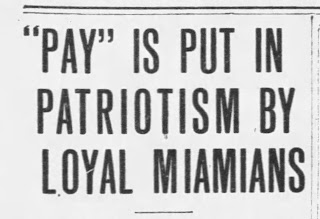From the Miami Daily Metropolis, 30 January 1918
In January 1918, while American soldiers trained for the battlefields of Europe, Miamians joined other Americans in the flood tide of patriotic fervor that accompanied the U.S.'s entrance into the Great War. It wasn't that they lacked concern about the war. Engineers worried that federal orders would divert resources from the construction of the first causeways to Miami Beach. And city leaders sheepishly explained that Miamians would be hard-pressed to observe the "wheatless Wednesdays" encouraged by Herbert Hoover's Food Administration because of a lack of cornmeal and barley. But these concerns faded the evening of January 29, when 800 Miamians poured into the city auditorium for an evening of speakers and patriotic songs encouraging them to put their money into the war effort.
R. Freeman "Roddy" Burdine, owner of Miami's flagship department store, organized and oversaw the event in order to sell what were known as War Savings Thrift Stamps. These stamps, introduced by the Treasury Department and sometimes known as "little baby bonds" were cousins to the more famous Liberty Bonds that Secretary of the Treasury William McAdoo had introduced as a patriotic way to fund the war. Aimed at investors who could not afford the $50 Liberty Bonds, the stamps went for 25 cents each. A buyer could collect them on cards until they could trade them for a $5 War Savings Stamp;" ten stamps could then be traded for a Liberty Bond.(1)
The event featured five speakers, all of whom used a combination of patriotic appeals, anti-German propaganda, and not-so-subtle arm-twisting to get the crowd to fork over their money. "If you can't put the 'I' in 'fight,'" one encouraged the crowd, "you can put the 'pay' in patriotism." Another guilt-tripped the crowd with stories of those who were unwilling to make sacrifices for the war:
Such high-pressure tactics were common in the war years, when enforcing patriotism through peer pressure was common and outright violence against those deemed less-than-patriotic was not unheard of. Even the members of Miami's Anglers' Club decided against holding their meeting at the same time as rally lest "any act of theirs be considered unpatriotic."
While it is difficult to ascertain who spoke at the rally, it seems they were a mix of local officials and "four-minute men" employed by George Creel's Committee on Public Information (CPI) to rally crowds to support the war effort. None were as famous as Douglas Fairbanks or Mary Pickford, Hollywood stars who volunteered as "four minute men," but they were successful. By the end of the night, they had raised $5,000 for war.
(1) Richard Sutch, "Liberty Bonds", Federal Reserve History, https://www.federalreservehistory.org/essays/liberty_bonds
In January 1918, while American soldiers trained for the battlefields of Europe, Miamians joined other Americans in the flood tide of patriotic fervor that accompanied the U.S.'s entrance into the Great War. It wasn't that they lacked concern about the war. Engineers worried that federal orders would divert resources from the construction of the first causeways to Miami Beach. And city leaders sheepishly explained that Miamians would be hard-pressed to observe the "wheatless Wednesdays" encouraged by Herbert Hoover's Food Administration because of a lack of cornmeal and barley. But these concerns faded the evening of January 29, when 800 Miamians poured into the city auditorium for an evening of speakers and patriotic songs encouraging them to put their money into the war effort.
R. Freeman "Roddy" Burdine, owner of Miami's flagship department store, organized and oversaw the event in order to sell what were known as War Savings Thrift Stamps. These stamps, introduced by the Treasury Department and sometimes known as "little baby bonds" were cousins to the more famous Liberty Bonds that Secretary of the Treasury William McAdoo had introduced as a patriotic way to fund the war. Aimed at investors who could not afford the $50 Liberty Bonds, the stamps went for 25 cents each. A buyer could collect them on cards until they could trade them for a $5 War Savings Stamp;" ten stamps could then be traded for a Liberty Bond.(1)
The event featured five speakers, all of whom used a combination of patriotic appeals, anti-German propaganda, and not-so-subtle arm-twisting to get the crowd to fork over their money. "If you can't put the 'I' in 'fight,'" one encouraged the crowd, "you can put the 'pay' in patriotism." Another guilt-tripped the crowd with stories of those who were unwilling to make sacrifices for the war:
"There are some in this town today, on this meatless Tuesday, who ate meat. And they got away with it. Nobody will find it out, and their consciences do not hurt them, for they have no consciences. But if that meat which they ate, not going to a soldier in the trench as it would have done had these people not eaten it, causes that soldier to weaken, and maybe as a result of that soldier's weakening causes a line to break and possible a sector, and finally lose the war, then it will come forcibly back to him who ate meat, thinking that nobody would find out."
Such high-pressure tactics were common in the war years, when enforcing patriotism through peer pressure was common and outright violence against those deemed less-than-patriotic was not unheard of. Even the members of Miami's Anglers' Club decided against holding their meeting at the same time as rally lest "any act of theirs be considered unpatriotic."
While it is difficult to ascertain who spoke at the rally, it seems they were a mix of local officials and "four-minute men" employed by George Creel's Committee on Public Information (CPI) to rally crowds to support the war effort. None were as famous as Douglas Fairbanks or Mary Pickford, Hollywood stars who volunteered as "four minute men," but they were successful. By the end of the night, they had raised $5,000 for war.
(1) Richard Sutch, "Liberty Bonds", Federal Reserve History, https://www.federalreservehistory.org/essays/liberty_bonds


Comments
Post a Comment